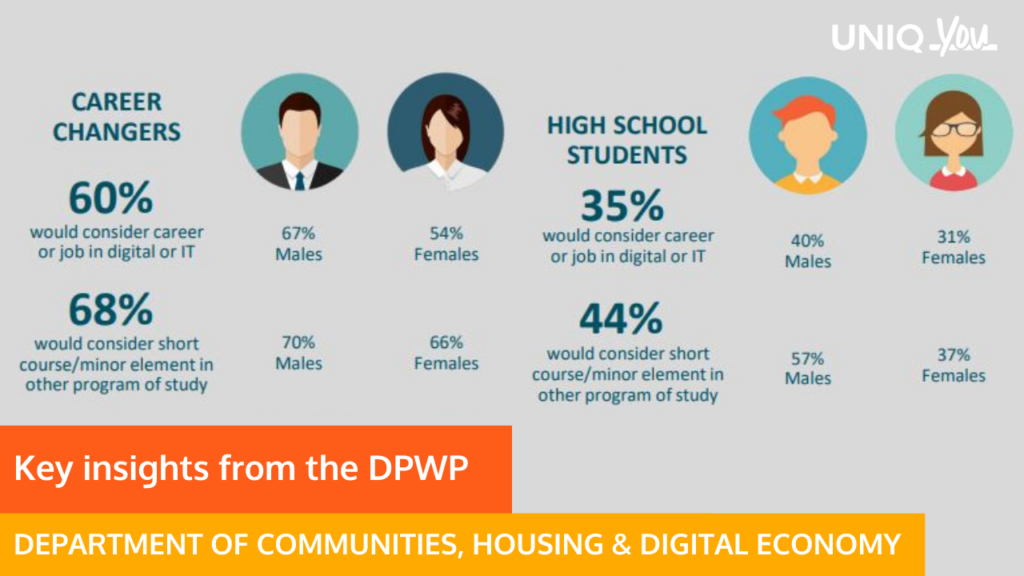When tasked with delivering a state-wide cross-sector digital skilling program, it is vital to get the consultation right – to make sure there’s a platform for each voice, opinion, experience and aspiration. The Digital Professional Workforce Action Plan (DPWP) has already reached out to industry, schools, parents, regional business and mature-age to gain insights, viewpoints and lived-experiences in relation to digital skills development. These important insights are helping shape our awareness and training programs to ensure the best outcomes can be achieved for Queenslanders.
While gathering insights, we discovered:
- Only 29% had heard the term ‘digital professional’
- 42% were surprised by the variety of roles included under the ‘Digital or Information Technology’ banner
- 64% agreed that digital or IT is a highly respected career or profession in the community
- 64% had a very positive view of digital or IT careers
- Only 68% of parents would suggest a career or job in digital or IT to their child
Those interviewed listed the barriers to considering a digital or IT career as:
- Not knowing enough about what an IT or digital worker actually does
- Not knowing the diversity or types of roles (or employers) that are available
- Not having role-models available as examples or to ask questions of
- Believing the industry only suits introverts, people who like working alone, people who like working desk jobs/office jobs
- Believing only people who are very good at maths/science will succeed
And in early March, we heard from our peer in government as to how they see the shape of future digital skilling and what they consider as critical areas of focus.
The workshops were structured around four priority cohorts – women, regional/rural/remote, people with disability/neurodiverse and First Nations.
In the women consultation workshop we heard:
- Concerns about working in a largely male-dominated field
- Cost-of-living stress preventing career change
- Balancing parenting and study/work responsibilities
- The impact of ageism on employment opportunities
- The opportunity for remote/hybrid work.
In the regional/remote/rural consultation workshop we heard:
- Uneven competition for skilled workers by larger entities
- Competitive disadvantage of larger population centres
- Low internet connection speeds and lack of connectivity, even in some outer-urban locations
- Hard to prioritise gaining digital skills against other pressing demands (e.g. climate events).
In the people with disability/neurodiverse consultation workshop we heard:
- Fears of discrimination and lack of understanding
- Rigid training/working environments that do not accommodate diverse circumstances
- Prevalence of stereotyping and ‘diversity hiring’ stifling career progression/respect
- Social and economic exclusion
- Community/infrastructure barriers such as lack of accessible transport options.
In the First Nations consultation workshop we heard:
- The importance of making digital skills and opportunities relevant to community
- The need to travel to undertake training forces displacement from community
- Visualising career pathways can be powerful
- People may be interested in a digital career, but be unsure where to start
- First Nations people have a strong preference to receive training from other First Nations people.
While there was significant diversity across the consultation groups, several common themes were identified throughout the workshops. In particular, the need for socially driven change and the dismantling of stereotypes were seen as key to shifting the dial in digital careers representation.
